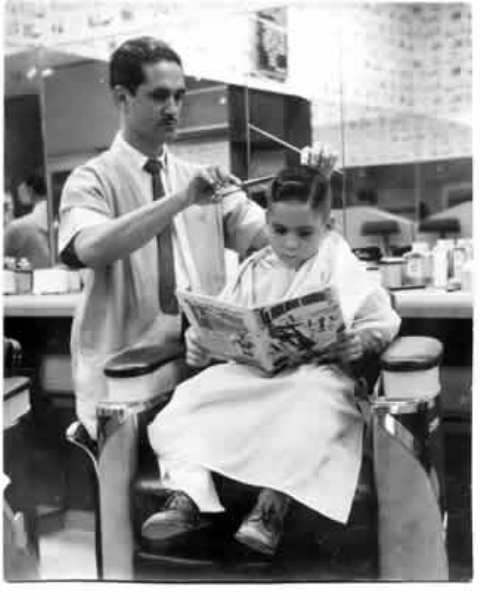"El Ciclon del '26"
Decided to get this one done before November, as it is more topical in October. Topical as well as tropical, suiting our latitudes. You may wonder how the subject at hand was selected. It started with a search, a continuing search for images and recollections.
Last week, yours truly spent some quality time with his mother and father. This is something highly recommended for all of you...enjoy their presence and their wisdom; do not wait until they have become but a loving memory preserved in images and recollections. Even though "to remember, is to live again," there is no substitute for the real people and events to which we are directly linked, physically and by life experience.
On October 20, as we spoke while we shared breakfast, dad, who has an uncanny ability to bring up historical subjects on their anniversary date, casually stated: "Today is the anniversary of the 1926 Cyclone; it happened 80 years ago. I remember it well - I was seven at the time." Father knows what he is doing when he says things like that, seemingly so casually and nonchalantly, within earshot of his perhaps too-curious son. Because immediately upon hearing this, my ears perked up, canine-like perhaps; after all, even when just a "seedling" in Cuba, I remember hearing about "el Ciclon del '26." Curiosity aroused, thus began the questioning to which he responded with the obvious pleasure of one who wants to share recollections of an experience, although perhaps one not so pleasant.
For starters, in Cuba it was the custom to call hurricanes "ciclones," or "cyclones." A hurricane is the name commonly given to a tropical cyclone, so the terms are used interchangeably. In Mayan mithology, Huracan was the god of storms, winds, and fire, and from this the word "hurricane" came to be, at least in this hemisphere. OK, OK, enough with the technicalities. Perhaps I should have been a weatherman, possibly inspired by the daily weather report from the National Weather Observatory in Havana, then under the direction of Professor or Dr. Millas.
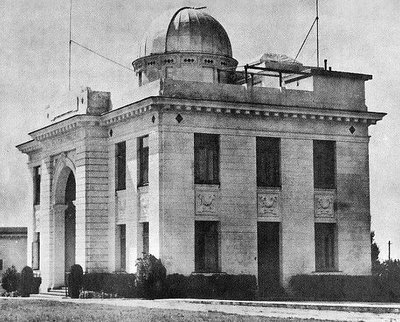 The daily report on television, as I recall it, with the black-and-white image of the observatory in the background just as you see in this photo from guije.com, and delivered by a disembodied voice, went something like this: "Cielos parte nublados y lluvias diseminadas por todo el territorio nacional." Translation: "Partly cloudy skies and scattered rain throughout the national territory." Meaning clouds and rain here and there over Cuba. The report seemed unchanging, at least to this untrained wannabe weatherman - therefore the forecast was always accurate, right? No fancy weather experts expounding on warm and cold fronts, with dozens of technological aids and graphics to enhance the presentation.
The daily report on television, as I recall it, with the black-and-white image of the observatory in the background just as you see in this photo from guije.com, and delivered by a disembodied voice, went something like this: "Cielos parte nublados y lluvias diseminadas por todo el territorio nacional." Translation: "Partly cloudy skies and scattered rain throughout the national territory." Meaning clouds and rain here and there over Cuba. The report seemed unchanging, at least to this untrained wannabe weatherman - therefore the forecast was always accurate, right? No fancy weather experts expounding on warm and cold fronts, with dozens of technological aids and graphics to enhance the presentation."Enough of that already. Get to the story!" Yes, I will. Sorry about that.
So, dad began his fascinating narration, the events still clear and vivid in that wonderful, archival mind of his. He shall tell the story, with no comment from the sidelines. Dad, the Ghost Blogger...seen here about a year before the 1926 Hurricane, with his brothers and sisters, then living in the Luyano neighborhood, in a building not unlike the one where the storm found them in 1926.
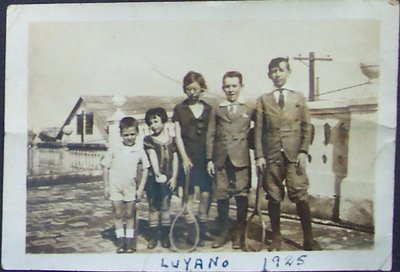 Left to right: Nicanor - known to many as "Nick" and to me as "dad;" sisters Berta and Lola; brothers Manuel and Dario Jr.
Left to right: Nicanor - known to many as "Nick" and to me as "dad;" sisters Berta and Lola; brothers Manuel and Dario Jr."At the time, we were living at San Nicolas street, number 130, between Salud and Reina streets. We lived on a second floor, which was really the equivalent of a third floor in the United States. The first or street-level floor of a building was just the street level, and not numbered.
The storm came in around 6:00 AM; around 8:00 to 9:00 AM, things got very intense - the door rattled, there was a lot of noise, and water was coming under the door. We moved a heavy armoire, a big three-section piece, in front of the door. Everyone helped push the heavy cabinet in front of the door. I was only seven, so I did what I could to help. Mother, father, my brothers Dario and Manolo, my sisters Berta and Lola - all of us pitched in. Even though we managed to put the armoire in front of the door and made sure it was positioned on its narrow side so as to offer more resistance, the door under pressure from the wind kept pushing the cabinet back, so we had to keep pushing it back against the door...
There was a Chinese restaurant within sight of our apartment or flat, called 'El Pacifico.' Its roof was made of corrugated galvanized metal sheets, which the wind loosened and then blew away; on top of our building was an old iron water tank, which also blew off and fell into the street. Fortunately, no one was hurt by it. At the time, the Cuban Telephone Company's Havana telephone exchange was under construction; despite the fact steel beams were used for the framework, the tower on top was twisted by the storm winds. This building was at the intersection of Dragones and Aguila streets.
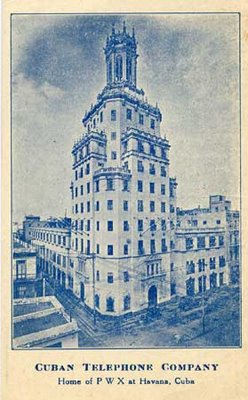
(Cuban Telephone Co. postcard - 1928 - from Reverse Time Page
www.uv201.com)
The storm's intensity started dissipating or dying down around 4:00 PM. Fortunately, we had suffered no damage, although all of us were tired at that point. One thing we did not have to worry too much about, unlike today, was losing power. Although we had electricity, there was no air conditioning, most people had no radio-we did not have one ourselves until 1932, when we acquired an Atwater-Kent -we lived on Aguila street then; of course there was no TV. We had an icebox, instead of a refrigerator, which cooled with blocks of ice we bought from the ice sellers. The stove was fueled with charcoal. So, when you lost electric power, at worst, you had to light candles or perhaps kerosene lamps, but everything else was unaffected and normal routine resumed fairly quickly."
Dad proceeded to tell a little anecdote involving his brother Dario, who perhaps was the most colorful of the Quiroga brothers. "Your uncle Dario had gone to work early as usual that day. I am pretty sure he was already employed with Charles Irwin and Company. Around 8:00 AM he returned home, happy because Mr. Irwin had closed shop and sent everyone home. 'The place is closed, no work today,!' happily declared Dario. 'So, I am going to lie down and rest.' 'Lie down and rest?,' said our father Dario Sr. 'We ALL have to be up and ready to deal with this storm!' And thus your uncle had to postpone his nap."
The cyclonic reminiscences did not end here. The next day we went out for a bite to a nice Argentinian restaurant in Miami - Rincon Argentino - recommended for those of us who are not ashamed to sink our teeth into some good beef - with my younger sister and her family, including her in-laws. Somehow the topic at some point veered into the subject of...el Ciclon del '26. Sis' father in law weighed in with some of his own anecdotes - WARNING - not for the squeamish. We will let him tell the story also, unembellished.
"I was four at the time, so remember very little. We lived in Regla, across the bay from Havana, in 1926. I do recall, when I was older, the family would speak of my uncle Fermin and what happened to him that day. See, people had the dangerous custom, in those days of going out when a storm was raging, to see the wind and its effects. Many would go to the seawall - the Malecon - to watch the massive waves breaking on the shore and crashing onto the seawall. Grocery stores -bodegas- stayed open to serve the crowds; the main or street entrances would be locked, but you'd go in the back way to buy beer and spirits. Storms were excuses for people to get drunk.
Anyway, I am told my uncle Fermin went out to look around when the hurricane was still raging. Unfortunately, a piece of corrugated metal roofing flying through the air hit and decapitated him..."
God knows how that four-year-old would have been traumatized had he witnessed that horrible tragedy! This makes us understand a little better why in this day and age, the authorities go nuts when folks fail to heed sensible advice and fail to take steps and common sense precautions to protect themselves from these natural forces. Never underestimate the power of Mother Nature, whom we ignore at our own and often deadly risk.
Some who read this and have never experienced tropical weather, whether "el Ciclon del '26" or any other major storm may place these stories, recollections, and anecdotes in the category of fiction or "tall tales." Twisted steel-framed towers; door-rattling-and-pushing winds; water tanks flying through the air, and beheaded unfortunates. Perhaps you also consider this image to belong to the realm of the fantastic or impossible...
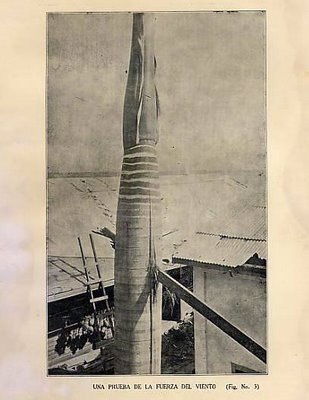 Photo from www.guije.com - originally published in a book titled "Memorias del Ciclon de 1926," authored by the Office of Public Works of the Republic of Cuba in 1927. A sampling of images taken from the book can be seen at www.guije.com/libros/ciclon/index.htm
Photo from www.guije.com - originally published in a book titled "Memorias del Ciclon de 1926," authored by the Office of Public Works of the Republic of Cuba in 1927. A sampling of images taken from the book can be seen at www.guije.com/libros/ciclon/index.htmImagine the energy needed to drive a wood beam right through the trunk of the palm tree in the photograph...perhaps the engineers among you wish to calculate it just for fun.
Storms like the Hurricane of '26 are capricious and unpredictable. Cuba has been flogged for over 47 years by a capricious, unpredictable, and deadly sociopolitical storm which has caused far more harm and loss than many natural storms put together. It is time for that evil wind to pass on and allow freedom's sunshine to once again bathe the Pearl of the Antilles.
